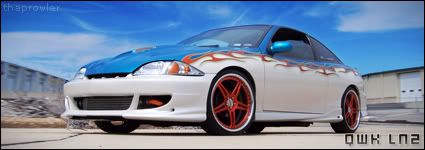<i>Foreword from the author:</i> Finally, I've put some of the many idle hours I spend at work to use. This is just a minor compiling of some of the very common questions posted in this forum. I hope that it helps weed out some of the basics and gets more people posting the good stuff.
<b>JBO Boost MINI--FAQ:</b>
<i>This FAQ is compiled from the questions and answers that have been posted over and over again in the Boost forum. This thread does not necessarily represent the opinions of J-body.org or its administrators and representatives.</i>
<b>General questions-</b>
<I>What is better, a turbocharger or supercharger?</i>
----It totally depends on what you are going for. Some superchargers are known for excellent reliability (Eaton/Magnuson roots types have been known to last over 100,000 miles) but are limited in power potential. Turbochargers are will known for having vast potential and requiring a bit more TLC and maintenance than most superchargers. The fastest cars bearing J-body names are turbocharged, and the fastest cars on the J-body.org are turbocharged. But it's likely that the most reliable boosted cars are those running low levels of boost with the GM Supercharger kits. What are your goals and priorities?
<I>How much boost can I run without sacrificing reliability?</i>
----You do not run boost if you want to maintain maximum reliability. Normally aspirated cars are not designed to run boost in any way, shape, or form. Most people will tell you that you should be able to run 5 or 6 psi properly tuned for a very long time. Some people have gotten away with over 10 psi without breaking anything. But there is no magic breaking point number that we can hand you. All motors are different. They are mass produced with different flaws, and they are treated differently by the car's owners. The same applies even more so for transmissions.
<I>Will XXXXXX turbocharger/supercharger work on my car?</i>
----As stated above, normally aspirated cars are not designed to run turbo or superchargers. You will need a custom exhaust manifold for a turbo, and a custom intake manifold for a supercharger (there are rare exceptions, but custom work would still be required).
<I>How much boost can I run using the stock fuel system?</i>
----It is strongly recommended that you do not run any boost without an adjustable rising-rate fuel management unit at least (example-
http://www.cartech.net/fmu2020.htm). It is recommended that you use a more dynamic form of fuel control, such as the Apexi S-AFC or the Greddy E-manage.
<b>Turbocharger questions-</b>
<I>Where can I find a turbo kit?</i>
----Please check the following websites before asking this question: speed-craft.com, itsturbo.net, exploitedracing.com, and cavalierconnecton.com.
<I>Are there any cheaper ways to set up turbo on my car?</i>
----Yes, but to save money, you must sacrifice time, quality, or a bit of both. If you decide to source the new parts yourself and fabricate everything needed, the quality will depend on the time and care that you put into it. Even more money can be saved by using a junkyard turbocharger off another car, but those turbos usually are in need of a rebuild. Some of those OEM turbos are somewhat difficult to fabricate manifolds for as well. Research the turbocharger carefully and make sure you can acquire everything else you'll need to make it work before you buy it.
<I>At what boost level will I need to install an intercooler?</i>
----It is generally accepted that you can run 5 or 6 psi without an intercooler. Keep in mind that it'll be safer if you use an intercooler even at low boost levels. The cooler air coming into the engine can yield more peak power as well, so it's a good idea all around. Most junkyard intercoolers will work just fine, but if you're planning on squeezing some major power out of your turbo, it'd be best for you to get an intercooler that is built for racing applications.
<I>What size exhaust piping should I use with my turbocharger?</i>
----You want the area after the turbocharger exhaust outlet to be under as little pressure as possible. 2.5 inch piping with a high flow muffler should be installed at the very minimum. 3 inch piping would be even better, and an exhaust cut out would be a great idea for racing. Any muffler shop that works with performance applications should be able to assist you.
<b>Supercharger questions-</b>
<I>Where can I find a supercharger kit?</i>
----RSMracing.com produces kits for the 2.2/2200, 2.4, and Ecotec motors. GM produces a supercharger kit for the 2000+ 2.4L engine. It can also be made to work with pre 2000 2.4 models by swapping to the 2000+ starter and installing a fuel management unit and/or a digital fuel control device (Apexi S-AFC, Greddy E-manage). The GM supercharger kit can be ordered from GMpartsdirect.com and Paceparts.com as well as the dealerships.
<I>Is it possible to make a junkyard supercharger setup?</i>
----Yes. Most junkyard superchargers will require a custom intake manifold to work. These manifolds tend to be more complicated and difficult to make than turbo manifolds, which is one of the reasons that custom turbo setups are more popular. Just like custom turbo setups, the quality will depend on the time and care you put into it.
<I>Can I use an intercooler with a supercharger setup?</i>
----Roots superchargers
http://www.magnusonproducts.com must have the intercooling system integrated into the intake manifold. It would be a complicated and expensive fabrication. Centrifugal superchargers
http://www.vortechsuperchargers.com run a pipe to get air to the throttle body, just like turbochargers do. They can use any intercooler that turbo cars use.
<I>What size exhaust piping should I use with my supercharger?</i>
----Treat a supercharged motor like any high-powered application as far as the exhaust is concerned. 2.5 inches should be appropriate for most supercharged street applications. <br>
<img src="http://www.j-body.org/registry/tyranthraxus/thumbnail_bluehood2.jpg"> <img src="http://www.j-body.org/registry/tyranthraxus/yy.gif">
<a href="http://www.cardomain.com/id/aasyranth">96 Sunfire GT Turbo</a>







